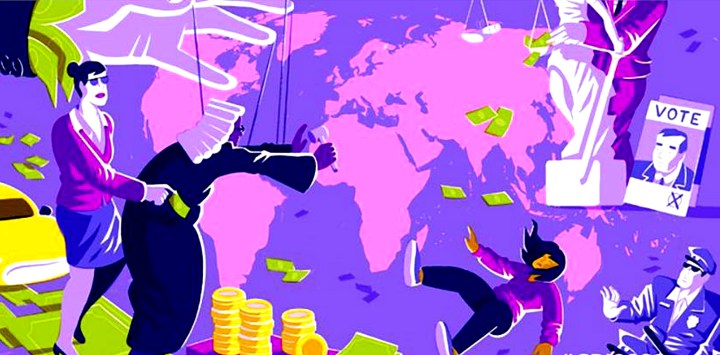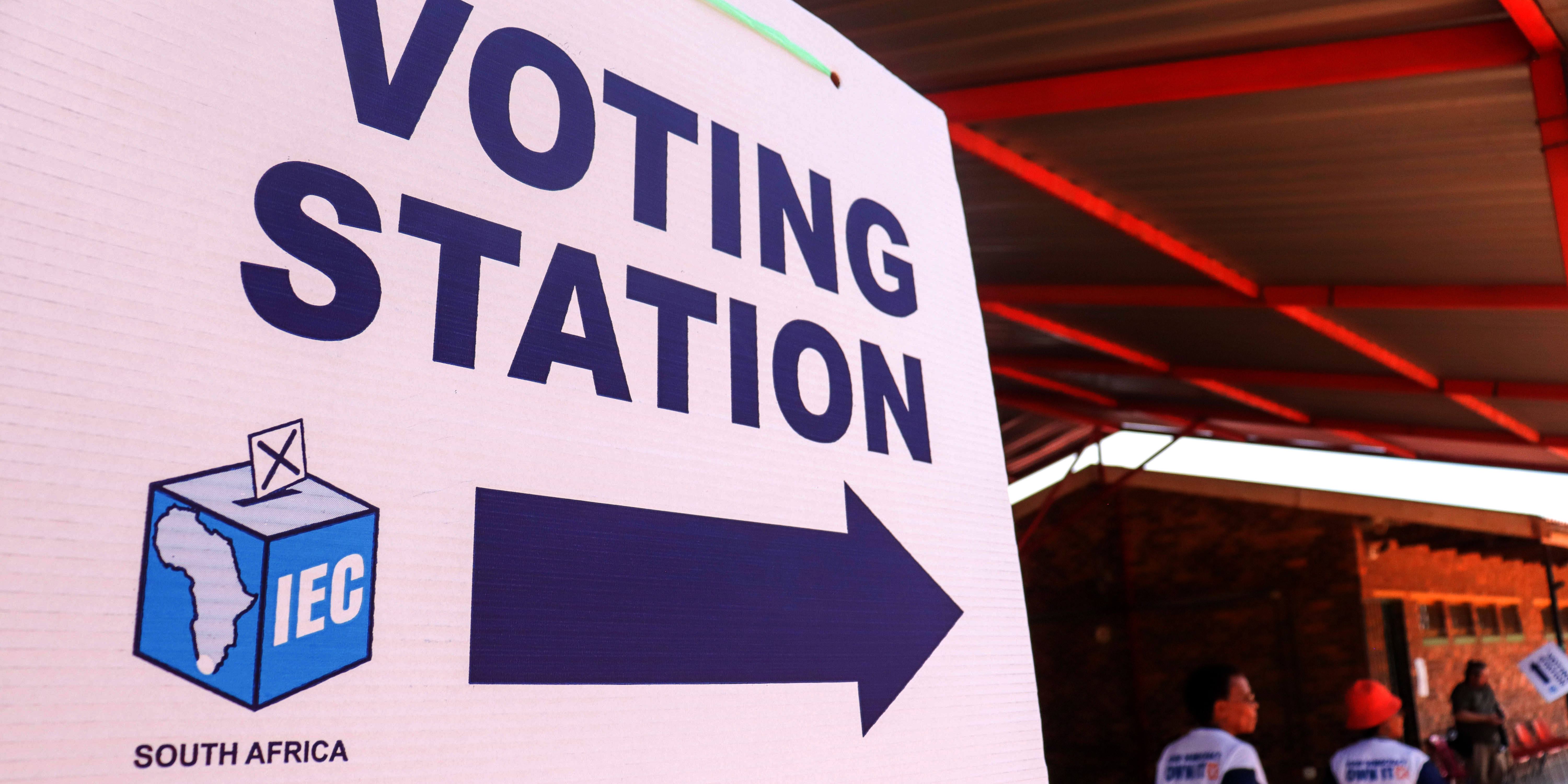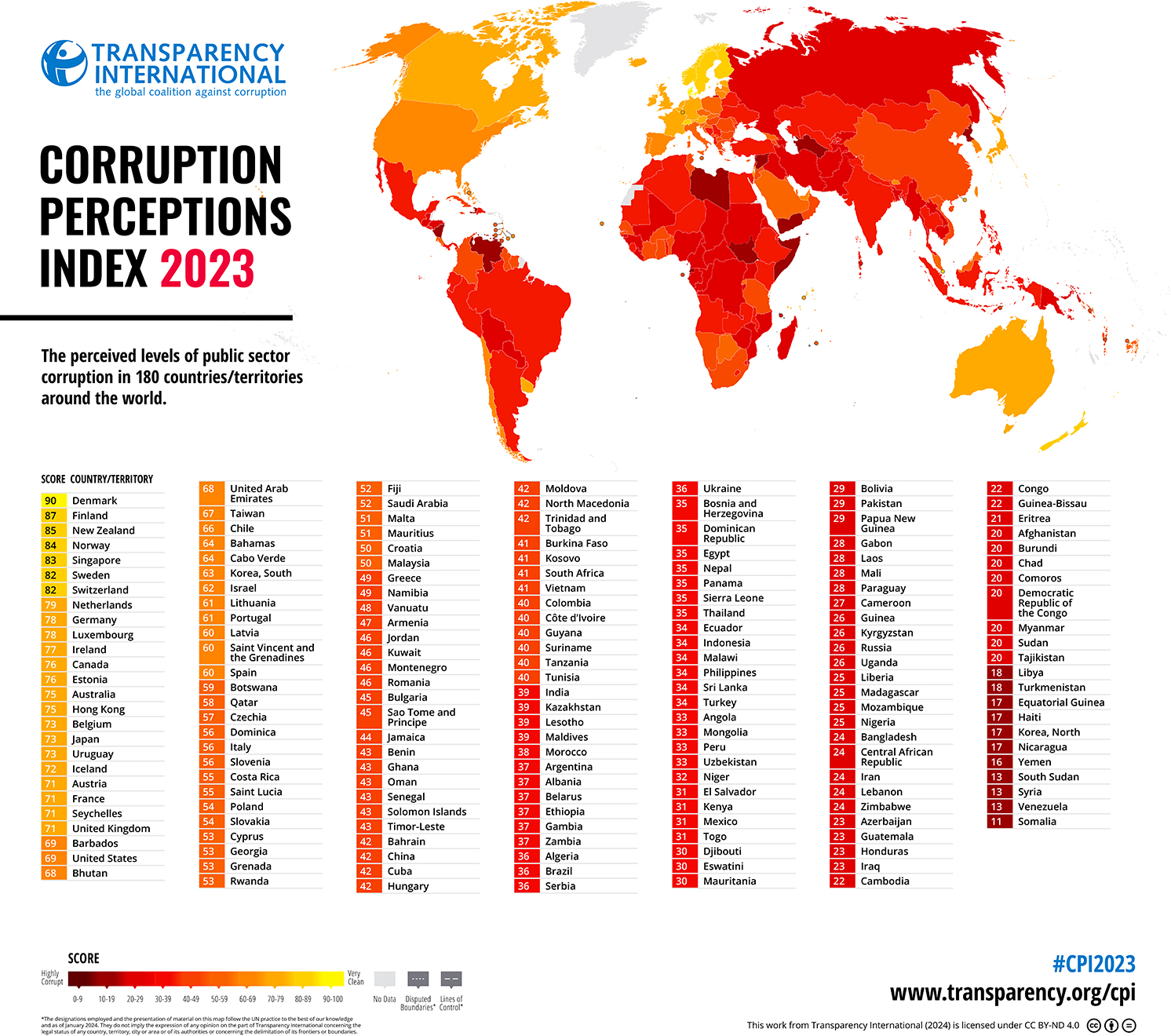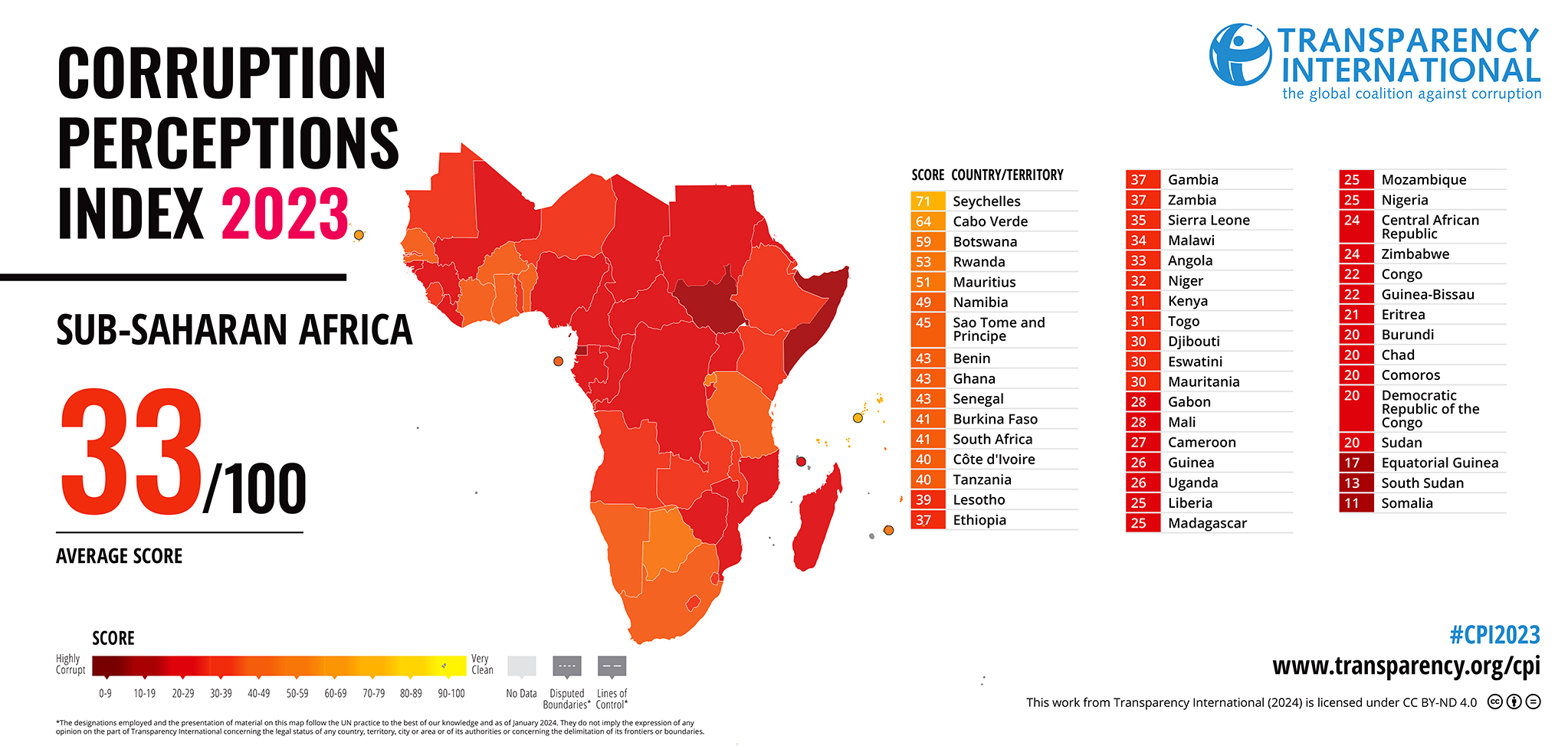TRANSPARENCY INTERNATIONAL REPORT
SA records its lowest score on Corruption Perceptions Index

South Africa now falls into the category of ‘flawed democracies’. The latest annual Corruption Perceptions Index says efforts to fight public sector corruption are faltering. The index partly blames a global decline in justice and the rule of law.
Transparency International on Tuesday released its annual Corruption Perceptions Index (CPI) report.
The CPI is the leading global indicator of public sector corruption, providing an annual comparative snapshot of 180 countries and territories.
The index for 2023 is calculated using data from 13 external sources. It ranks the countries and territories around the world by their perceived levels of public sector corruption, scoring on a scale of 0 (highly corrupt) to 100 (very clean).
SA’s bleak picture
South Africa scored 41 – two points below its 2022 score, below the global average of 43 and the lowest score the country has ever received.
SA now falls into the category of “flawed democracies”.
Full democracies have an index average of 73, flawed democracies have one of 48, and non-democratic regimes have an average of 32.
South Africa was one of 23 countries that reached their lowest scores this year.
With a score of 41, South Africa ranked 72 out of 180 countries, sitting alongside Burkina Faso, Kosovo and Vietnam on the global index, and coming in joint 11th with Burkina Faso on the regional table of sub-Saharan Africa.
South Africa was also noted in the report as one of the sub-Saharan African countries to watch, as 2024 marks 30 years since the end of apartheid and the ushering in of a new democratic era.
“As the country approaches the 2024 general elections, the executive continues to lead ongoing anti-corruption efforts that seek to draw in stakeholders from across society, including by setting up the National Anti-Corruption Advisory Council,” read the report.
“This presents an opportunity to launch anti-corruption campaigns geared towards political parties and their manifestos, and to mobilise the public and civil society to hold the country’s leaders to account.”
The CPI also noted the global trend of weakening justice systems, according to the Rule of Law Index which draws on expert and household surveys to measure the rule of law in countries and jurisdictions – including South Africa, which ranks 56th out of 142 countries.
The Rule of Law Index was referenced in this year’s CPI report and highlighted as a challenge experienced by every region on the index, as it creates an environment of impunity for and reduced accountability of public officials involved in corruption.
Karam Singh, executive director of Corruption Watch, said: “It is frustrating that, in a country like South Africa, where the corrupt have been exposed for all to see in such public processes as the Zondo Commission and robust media investigations, so few of the implicated parties have been brought to justice.
“There is an urgency to our problem of corruption, as citizens witness the unravelling of cities and infrastructure because of years of impunity and State Capture.
“With elections looming in a few months, the need for accountable leaders of integrity could not be more critical,” said Singh.
According to the Africa Organised Crime Index, South Africa has a high level of corruption in its public sector, with maladministration, procurement corruption and abuse of authority being the most common forms.
The sectors that account for the most corruption reports are the police, education and health.
“While the country has comprehensive anti-corruption laws and agencies, enforcement has historically been inadequate, with many current and former government officials avoiding prosecution.
“The ruling party has used its majority in Parliament to block crucial legislative oversight investigations, protecting its representatives from corruption inquiries,” read the report.
Hennie van Vuuren, the executive director of Open Secrets, said that while indicators like the CPI are helpful, they only tell part of the picture and also have shortcomings.
“These are generally the perceptions of international business people of levels of corruption. What we know from our experience in State Capture is that corruption is a globalised phenomenon and that many of the people who are the biggest perpetrators of economic crimes are not only our political elites but are also corrupt auditing companies, corrupt banks, corrupt management consultancies – and most of them have their headquarters or a significant presence in countries that are often perceived by the CPI index to be the least corrupt,” he said.
Van Vuuren stressed that these indicators alone cannot be used to reveal the true extent of corruption in a country like South Africa
“There are certain global corporations at play as well who are involved in this … they cannot be absolved of their complicity, and also in building an architecture that enables corruption in a country like South Africa,” he said.
“There’s no doubt we have worryingly high levels of corruption that have a profound impact on human rights in South Africa, and on the quest for social justice.”

As South Africa approaches the 2024 General Elections, the executive continues to lead ongoing anti-corruption efforts that seek to draw in stakeholders from across society, including by setting up the National Anti-Corruption Advisory Council. (Photo: Gallo Images / Sharon Seretlo)
Ramaphosa’s administration ‘more corrupt’ than Zuma’s
According to DA leader John Steenhuisen, President Cyril Ramaphosa has “resigned himself to turning South Africa into a global corruption basketcase”.
In a statement released on Tuesday, Steenhuisen decried Ramaphosa’s term of office, saying that his administration is more corrupt than that of his predecessor, Jacob Zuma.
“Ramaphosa is directly and personally responsible for South Africa’s plunge in the rankings. The State Capture Commission confirmed that ANC cadre deployment forms the foundation for capture and corruption. Ramaphosa is the former chairman of the corrupt deployment committee. He is also currently defending this corruption against the DA’s court action to declare cadre deployment unconstitutional,” read the statement.
The crisis of corruption, which has a severe negative impact on investment and job creation, is epitomised by the latest scandal involving Paul Mashatile, the deputy president of the country.
“Instead of taking firm action against Mashatile based on reports of a pattern of corruption and capture that even exceeds those involving former president Zuma, Rampahosa has cowered away from it.
“This then begs the question: If Cyril Ramaphosa and the ANC can now suspend Jacob Zuma, why can they not suspend Paul Mashatile and every other Cabinet member implicated in State Capture?”
South Africa’s drop in the CPI ranking, said Steenhuisen, confirms that Ramaphosa has betrayed the anti-corruption promises he made before the State Capture Commission.
“He has consistently shielded fellow ANC cadres implicated before the commission. He has consistently failed to act against members of his Cabinet who are implicated in brazen acts of corruption, including Minister Blade Nzimande and Deputy President Mashatile,” read the statement.
Steenhuisen’s demands come after News24’s Mashatile Unmasked series on a patronage network allegedly linked to the deputy president, and from which he allegedly benefits.
The latest article, published on Monday, alleges that Mashatile’s son-in-law, Nceba Nonkwelo, had in 2023 purchased a R28.9-million home in Constantia, Cape Town, through one of his companies, Bilcosat. This is despite Nonkwelo owing roughly R7-million to the Gauteng Partnership Fund for a failed social housing project in Johannesburg.
“Last week, it was revealed that during Mashatile’s tenure as MEC for Human Settlements in Gauteng, his department paid R134-million to a company owned by ANC donor Edwin Sodi for a housing project in Diepsloot that did not deliver a single house,” read the statement from the DA.
“This was one part out of a total of R828-million that was paid to Sodi by the department for various supposed projects. It was also previously revealed that Mashatile used Sodi’s luxury mansion on the Atlantic Seaboard in Cape Town on several occasions.
“This is in addition to millions of rands in loans granted by the Gauteng provincial government to a company owned by Nceba Nonkwelo, Mashatile’s son-in-law. In turn, proceeds were funnelled to another company that owns a R37-million mansion in Waterfall Estate where Mashatile had been living,” the DA statement said.
“A forensic audit launched following the revelations confirmed that the awarding of loans to Nonkwelo violated the Public Finance Management Act.”
Steenhuisen said Ramaphosa is now protecting Mashatile and that the ANC also shielded Zuma for decades from consequences for his corruption, as recently admitted by party secretary-general Fikile Mbalula.
“It was only when Zuma started posing an electoral threat, that the ANC suddenly decided to act against him. It appears that leaders in the ANC, like Zuma and Mashatile, are free to loot as much as they want, as long as they don’t break ranks with the party.”
Presidential spokesperson Vincent Magwenya released the following statement in response to the Corruption Perceptions Index report:
“President Ramaphosa has, amongst other priorities, focused his administration on the rebuilding of the NPA and law enforcement agencies that had been annihilated during the regrettable period of state capture. That process has not been an overnight event. It has taken time, however, the impact has been immediate. Herewith, below are some of the highlights of the work done by the 6th administration in the fight against corruption.
Fighting corruption, ending State Capture and corruption
- Appointed new leadership at the Hawks, which has restored credibility and stability and led to action against corruption.
- Appointed a new National Director of Public Prosecutions on the recommendations of an independent panel following a transparent public process.
- Established the National Prosecuting Authority (NPA) Investigating Directorate to prosecute state capture and other significant corruption cases. To date, the Investigating Directorate has taken 34 state capture and corruption cases to court, involving 203 accused persons and 65 accused entities. The NPA has also secured the conviction of over 500 government officials and nearly 800 in the private sector on offences related to corruption since 2019.
- Appointed SIU Special Tribunal to expedite civil claims against corrupt individuals and the recovery of stolen funds. Since its establishment, it has recovered over R8.6 billion.
- Granted freezing orders of R14 billion for state capture-related cases to the NPA’s Asset Forfeiture Unit (AFU). To date, around R5.4 billion has been recovered and returned to the state.
- Undertook measures to end corruption and politicisation at the State Security Agency (SSA), including the appointment of new leadership and implementation of recommendations of a High-level Panel in the SSA.
- Appointed new leadership at the SA Revenue Services (SARS) leading to the rebuilding of the institution following state capture and to improvements in revenue collection, compliance trends and trade facilitation. Trust in SARS has been steadily improving since it hit an all-time low of 48% in 2018/19 and was recorded at 66% in 2023.
- Amended the State Capture Commission regulations to enable sharing of information and resources with NPA on state capture cases.
- Brought several major state capture and other serious corruption cases to court, including:
- VBS Mutual Bank case: Fourteen individuals, accused of stealing nearly R2.3 billion from the bank, are in court. Two people have been convicted so far.
- Eskom Kusile case: A former Eskom contracts manager and three others are in court on charges of fraud, corruption and money laundering. Although this case was struck off the roll in November 2023, the NPA says it is likely to re-enrol the matter once outstanding aspects of the investigation are finalised.
- Free State asbestos contract case: Senior political leaders, government officials and business people along with five entities are facing more than 70 counts of fraud, theft, attempted theft, corruption, money laundering and contravention of asbestos regulations. The trial date has been set for later in 2024.
- Estina Dairy case: A former Minister and 15 others are facing charges of contravening the Public Finance Management Act (PFMA), fraud, corruption, and money laundering. While the Estina case was provisonally withdrawn in 2018, charges were reinstated in 2022. The trial date has been set for August 2024.
- Durban Solid Waste case: The former eThekwini Mayor and 21 others are in court for alleged tender fraud worth R430 million.
- Transnet case: Two former Transnet CEOs, a former CFO and others face more than 300 counts of contravention of the PFMA, fraud, corruption and money laundering.
- Published details of all COVID-related and flood disaster procurement contracts online, setting a precedent for transparency in public procurement.
- Acted on recommendations by the State Capture Commission and put in place laws, institutions and practices that reduce the potential for corruption. These include nine new laws introduced in Parliament on areas such as public procurement, the involvement of politicians in administrative matters, the conduct of public servants, the intelligence services, money laundering and electoral reforms. Further research is being done on some of the recommendations of the Commission, such as making the abuse of political power a criminal offence.”
Poor scores for sub-Saharan Africa
The report notes that while there are significant improvements in a few cases, most countries in the region have stagnated or failed to make progress against corruption.
The regional average score of 33 remains unchanged, with 90% of countries in sub-Saharan Africa scoring below 50.
“The findings underscore the persistent challenges faced by the region, rooted in decades of severe underfunding in public sectors. The detrimental impact of corruption and illicit financial flows further compounds these issues, siphoning crucial resources away from essential public services.
“Corruption within justice delivery mechanisms continues to disproportionately affect the least privileged, including those reliant on public services such as women and children and those living with disabilities.”
At 71, Seychelles scored the highest for the region, followed by Cabo Verde (64) and Botswana (59). The lowest scores were Equatorial Guinea (17), followed by South Sudan (13) and Somalia (11).
Significant improvement has been noted in countries like Angola, which scored 33 – an improvement of 14 points since 2019 – and Ivory Coast, which scored 40, an improvement of 14 points since 2013.
Corruption thriving globally
“The CPI shows that most countries have made little to no progress in tackling public sector corruption. The CPI global average remains unchanged at 43 for the 12th year in a row, with more than two-thirds of countries scoring below 50.
“This indicates serious corruption problems,” read the report.
With a score of 90, Denmark topped the rankings for the sixth year in a row, followed by Finland and New Zealand with scores of 87 and 85, respectively.
Norway (84), Singapore (83), Sweden (82), Switzerland (82), the Netherlands (79), Germany (78) and Luxembourg (78) complete the top 10.
The report notes that countries experiencing conflict or that have highly restricted freedoms and weak democratic institutions tend to score worse.
Somalia, with a score of 11, followed by Venezuela, Syria and South Sudan, all of which scored 13, are at the bottom of the index.
Yemen (16), Nicaragua (17), North Korea (17), Haiti (17), Equatorial Guinea (17), Turkmenistan (18) and Libya (18) are the next lowest performers.
Although Western Europe and the European Union remained the top scorers, the region experienced a drop in its average score to 65 out of 100, as checks and balances weakened and political integrity eroded.
Eastern Europe and central Asia grappled with the dysfunctional rule of law, rising authoritarianism and systemic corruption, which was reflected in an average score of 35.
Asia-Pacific showed a long stagnant average score of 45 and countries historically at the top are backsliding.
Lack of judicial independence and a weak rule of law are enabling widespread impunity in the Americas, which has an average of 43.
“Among many other challenges, every region is struggling with weakening justice systems and diminishing accountability for public officials. This is enabling corruption to thrive with impunity, and regions are either stagnant in their corruption efforts or showing signs of decline,” read the report.
The way forward
According to the report, research and work with partners in more than 100 countries suggest that governments seeking to tackle corruption, promote justice and strengthen the rule of law should implement six recommendations:
- Improving access to justice is the first step against impunity and corruption.
- Strengthening the independence of the justice system by promoting merit-based rather than political appointments, and ensuring the system has qualified personnel and is properly resourced.
- Making justice more transparent as transparency can help shed light on the functioning of the justice system and make it more accountable.
- Introducing integrity and monitoring mechanisms, and ensuring that the special protections required by members of the justice system to perform their functions are not abused. Abuse may be prevented through dedicated whistle-blowing and reporting channels.
- Promoting cooperation within the justice system by defining clear and complementary responsibilities.
Expanding avenues for accountability in grand corruption cases by allowing justice institutions in foreign jurisdictions with a stronger rule of law to play a role in countering impunity by handling the legal proceedings in cases where countries’ justice systems are “unwilling or unable” to enforce against offenders. DM



















Yep, South Africa now in the same “flawed democracy” category as e.g. Uzbekistan!
Most ironically Israel the target that SA demonises as the hated satan, sits in the upper quartile in the same category as e.g. Japan, Germany etc…
Oh well
Weird index:
given the naming, lower should surely be a good thing?: ie the equivalent to being higher on the honesty perception index
…of course in our case it isn’t.
If you consider South Africa at 41 points is second best of the 5 original BRICS partners then you ask serious questions. Russia has 26 points (PetroSA). Also new BRICS partners Iran has 24 points.
The allegations of being worse than Zuma…..difficult, when they are almost all rotten or ineffective.
Vincent Magwenya’s bullet point response as to what Ramaphosa had done to fight corruption is the perfect argument for why Cadre deployment should be outlawed – virtually all the heinous crimes mentioned stem directly from it! And yet Cyril says it’s here to stay. What a palooka!
Strengthening the independence of the justice system by promoting merit-based rather than political appointments, and ensuring the system has qualified personnel and is properly resourced.
Our judiciary is independent and is appointed mostly on merit. Sometimes candidates are excluded by political forces. Like Unterhalter.
And therein lies the weakness in the American judiciary. Because their judges are appointed specifically because of their politics.
And then politicians exploit that to avoid accountability. Like Trump
BRICS is nothing more than a bunch of corrupt politicians from different countries that want to destroy the world!!! They will be the first to start world War 3(it has already started)